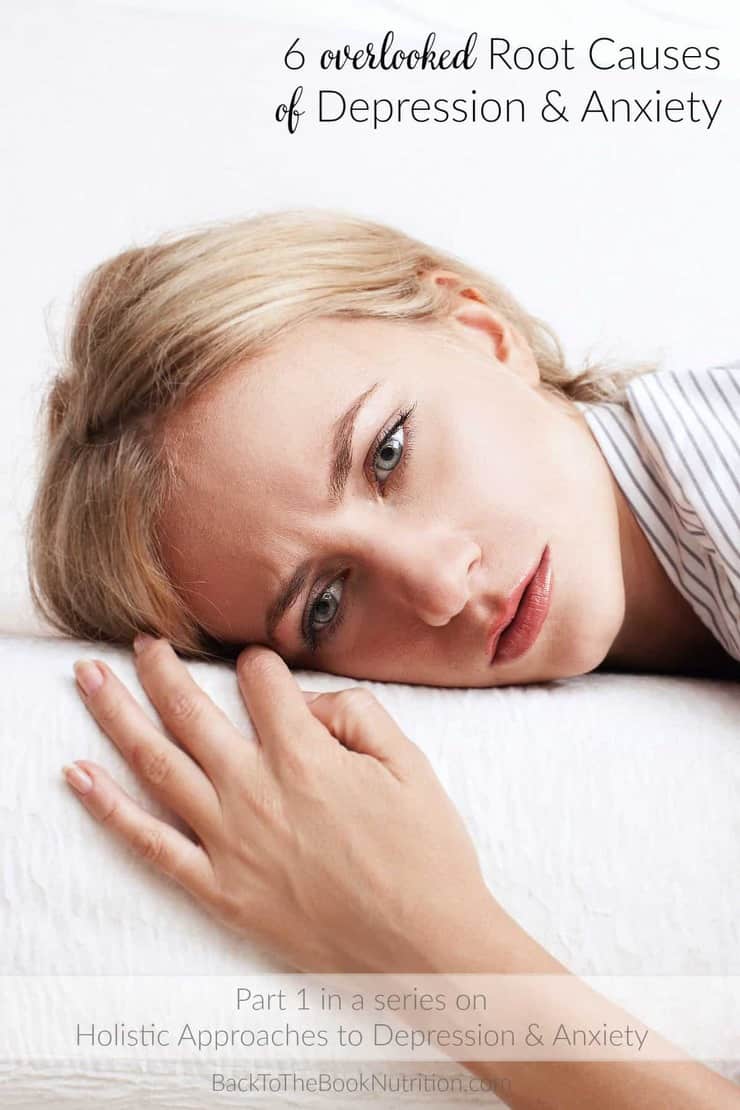Depression and anxiety affect tens of millions of Americans, but these 6 root causes are often overlooked. Part 1 in a series on holistic approaches to depression and anxiety.
Note from Dena: This guest post was written by Telma Moreira, Dietetic Intern, as part of a research partnership between Back To The Book Nutrition and post-graduate nutrition students from the University of Houston.
YOU ARE NOT ALONE…
Do you worry all the time, but feel unable to control it?
Do you struggle with feelings of hopelessness, worthlessness, or emotional numbness?
Do you always expect the worst to happen, and often feel you’re to blame for it?
Are you exhausted – mentally, emotionally, and physically – but can’t sleep…or can’t get enough sleep?
If you have experienced any of these feelings for longer than a few months, and find that they are interfering with your daily life, you might have anxiety or depression. Together, anxiety and depression (including postpartum depression) affect more than 55 million adults, the vast majority of them women.(1,2)
Anxiety and depression are not the same, but some of their symptoms can overlap.
Symptoms of anxiety (3)
Anxiety may present with any of the following symptoms:
- Nervousness
- Being overly and constantly worried
- Edginess
- Restlessness
- Feeling a lump in your throat
- Difficulty concentrating
- Fatigue
- Irritability
- Impatience
- Muscle tension
- Insomnia
- Excessive sweating
- Shortness of breath
- Stomachache
- Diarrhea
- Headache
- Appetite changes
Symptoms of depression (4)
The following are common symptoms of depression or postpartum depression:
- Constant, intense sadness
- Feeling hopeless
- Feeling worthless
- Lack of interest in what you usually enjoy
- Forgetfulness
- Trouble sleeping or excessive sleeping
- Lack of energy
- Fatigue
- Difficulty concentrating or making decisions
- Loss of appetite
- Pains or aches that do not go away
- Thoughts of harming yourself (or your baby, if you are a new mom)
6 OVERLOOKED ROOT CAUSES OF DEPRESSION AND ANXIETY
While western medicine usually treats these conditions as chemical imbalances that require medication, there are deeper root causes that are often overlooked.
1. Inflammation
What it is:
Inflammation is a normal response of your body to injury, toxins and infections. It has a regenerative purpose, and is purported to be short-lived.
When it becomes a problem:
Diet and lifestyle are powerful regulators of the flames of inflammation. Excessive inflammation occurs when your diet is overloaded with refined sugars, excessive calories or unhealthy fats, with chronic infections or obesity, lack of good quality sleep, and with a leaky gut (more about leaky gut below).
This sustained level of inflammation over time can tear down your brain and your nervous system, among other things (5) (more on this later).
2. Chronic Stress
What it is:
As with inflammation, stress is an adaptive response of our body for the sake of survival and facing occasional threats. In response to a stressor, complex and cooperative networks within our body are called into action.
One of the primary networks is called the “hypothalamus-pituitary-adrenal” (HPA) axis. As this fancy name suggests, it is constituted by the hypothalamus (a region in the brain), the pituitary (a pea-size region in the brain), and the adrenal glands (small glands located on top of the kidneys).
As a result of this networking, cortisol is released. Cortisol prepares the body’s “fight or flight” response to the stressor. This system works very well for occasional, major stressors.
When it becomes a problem:
If the HPA axis is constantly working, with no time for recovery, our health suffers. Cortisol is produced at a high rate during daytime, and does not slow down later in the day as it should. Over time, this can disrupt the signaling of the entire HPA axis, resulting in HPA axis dysregulation (sometimes called “adrenal fatigue”), which compromises the body’s ability to respond adequately to both major stressors and smaller, daily stressors. This can trigger a cascade of other hormonal, immune, and mood related problems, including depression and anxiety. (6)
It’s very important to note that you can suffer stress without feeling stressed. That is because autoimmune diseases, poor glucose control, lack of sleep, toxins, infections, food sensitivities, poor diet, and even obesity, also act as stressors to the body.
3. Oxidative Damage
What it is:
Oxidative stress is another normal response of the body that may cause damage when it lasts too long or occurs at higher than normal levels.
Remember your high school Chemistry course? Just in case you don’t, atoms (which are part of our cells) usually contain an even number of electrons. However, after some chemical reactions that happen in the body, some atoms are left with an odd number of electrons. They are called “free radicals”, and they desperately search for another atom to get that electron back.
In their desperate search, free radicals damage our cells. This process is called “oxidative stress” or “oxidative damage”.
The formation of free radicals is an everyday process during our lives, and part of the normal process of aging.
When it becomes a problem:
When there are too many free radicals, or too few antioxidants, our body’s natural defenses against oxidative stress can’t keep up and oxidative damage as well as chronic disease can develop.
The brain is particularly sensitive to oxidative stress and damage. Research has shown a strong relationship between depression and oxidative stress.
Apart from aging, what produces free radicals? A poor diet, toxins and heavy metals, smoking, and excessive alcohol intake, to name a few. We will see later how you can help your body be better equipped with antioxidants to combat those free radicals. (7)
4. Leaky gut (aka: Intestinal Permeability)
What it is:
Cells in the intestine form a tight wall that prevents most bacteria, undigested food particles, and toxic substances from passing into the blood. If your gut becomes too permeable – or “leaky”, it is almost as if the mortar between the bricks in the wall of your gut has eroded away, allowing these undesirable substances to enter your blood freely – and possibly even travel to your brain.
When it becomes a problem:
Inflammation, poor diet (consuming gluten if you have celiac disease or gluten sensitivity, conventional dairy, added sugars, excessive alcohol, etc.), antibiotics and other prescription medications (like antacids, oral contraceptives, and anti-inflammatories), and environmental toxins are a few of the most common contributors to leaky gut. More frequent exposure to these contributors increases the permeability of the gut. As more particles leak through into an area where they don’t belong, the immune system is called on more often to attack these “foreign invaders”. Ongoing immune attack can lead to skin conditions like eczema and rashes, food sensitivities, anxiety, and/or depression. (8)
5. Thyroid Dysfunction
What it is:
Thyroid conditions affect tens of millions of Americans and are far more frequent in women than in men. It is believed that, for as many as 25-46% of individuals diagnosed with depression, anxiety, the root cause of their symptoms is not psychological illness, but thyroid dysfunction and other related conditions instead.(9)
This is not to say that depression and anxiety are not real, but rather that the root cause is often misdiagnosed and, as a result, ineffectively treated.
When it becomes a problem:
Specifically, hypothyroidism (inadequate production of thyroid hormone) and Hashimoto’s thyroiditis (an autoimmune disease) can often be misdiagnosed as anxiety or depression. Likewise, symptoms of hyperthyroidism (overproduction of thyroid hormone) and Grave’s Disease (an autoimmune condition), such as sweating and heart palpitations, are often mistaken for anxiety.
The good news is that, once thyroid dysfunctions are corrected in these individuals, their depression/anxiety symptoms improve dramatically. If you’re dealing with any mood related symptoms, request that your healthcare provider order a full thyroid panel (not just a TSH) to rule out thyroid disorders. (8)
Note from Dena: If you do not have a provider to order a full thyroid panel for you, I’d be happy to arrange this through my Holistic Nutrition Coaching service.
6. Nutrient Deficiencies
What it is:
Low intake or low absorption (due to low stomach acid, poor gut health, etc.) of the nutrients below increases risk for anxiety and depression.
- Omega-3 fatty acids
- Vitamin D
- Vitamins B2, B6, B12 (8)
- Folate
- Iron
- Zinc
- Magnesium
- Copper
- Choline
When it becomes a problem:
Short term deficiencies in the nutrients above may only cause mild symptoms but, if not corrected quickly, multiple and more severe nutritional deficiencies can develop.
HOW TO ADDRESS ANXIETY AND DEPRESSION NATURALLY
Conventional medical treatment for anxiety and depression may include cognitive behavioral therapy and psychotherapy, as well as prescription medications such as selective serotonin reuptake inhibitors (SSRIs), buspirone, and benzodiazepines. While these medications can offer symptomatic relief, they can be difficult to get off of and side effects are often significant.(1,2)
That is not to say that medications aren’t warranted in some cases. In fact, if you are currently taking medication for anxiety/depression, do not stop taking it without first consulting your doctor.
Still, there is plenty you can do to help relieve your anxiety or depression naturally. At the same time, you will be improving your overall health, both physical and mental:
- Eat whole foods that decrease inflammation
- Correct nutrient deficiencies
- Fix your gut
- Address thyroid dysfunction
- Improve sleep habits
- Exercise
- Use relaxation techniques
- Maintain a healthy weight
- Consider natural supplements proven to help depression/anxiety
- Get counseling
We delve into each of these in more detail in Part 2 of this series.
Read Part 2 in this series now!
About the author: Telma Moreira is a registered dietitian in her country of origin (Argentina), working on the validation of her degree in the United States. After working for many years with seriously ill people, she became passionate of preventing disease through a healthy lifestyle.
Disclaimer: Information on this site is intended only for informational purposes and is not a substitute for medical advice. Always consult with a trusted healthcare provider before implementing significant dietary change. Read additional disclaimer info here.
Disclaimer: Information on this site is intended only for informational purposes and is not a substitute for medical advice. Always consult with a trusted healthcare provider before implementing significant dietary of lifestyle changes. If you are having suicidal thoughts, or considering harming yourself or others, please reach out for medical care immediately by calling 911, calling the Suicide Helpline at 1-800-SUICIDE, or by texting 741741 from anywhere in the United States. Read additional disclaimer info here.
References
- Mayo Clinic, https://www.mayoclinic.org/diseases-conditions/anxiety/symptoms-causes/syc-20350961 and https://www.mayoclinic.org/diseases-conditions/depression/symptoms-causes/syc-20356007
- Anxiety and Depression Association of America
- Grisanti, R. (2017). Has Your Doctor Missed Something? Causes of Debilitating Anxiety
- Watson, S. (n.d.). Harvard Health Blog. Recognizing the unusual” signs of depression.
- Kiecolt-Glaser, J.K., Derry, H.M., & Fagundes, C.P. (2015). Inflammation: Depression Fans the Flames and Feasts on the Heat. American Journal of Psychiatry, 172, 1075–
- Adam, E.K., Quinn, M.E., Tavernier, R., McQuillan, M., Dahlke, K.A., & Gilbert, K.E. (2017). Diurnal cortisol slopes and mental and physical health outcomes: A systematic review and meta-analysis. Psychoneuroendocrinology, 83, 25–41.
- Jimenez-Fernandez, S., Gurpegui, M., Diaz-Atienza, F., Perez-Costillas, L., Gerstenberg, M., & Correll, C.U. (2015). Oxidative stress and antioxidant parameters in patients with major depressive disorder compared with healthy controls before and after antidepressant treatment: results from a meta-analysis, Journal of Clinical Psychiatry, 76, 1658-1667.
- Madonna, K. (2017). Integrative Nutrition Therapy for Mood Disorders, Today’s Dietitian.
- Ryback, R. (2016). 4 Conditions That Resemble Depression, but Aren’t. Psychology Today.



